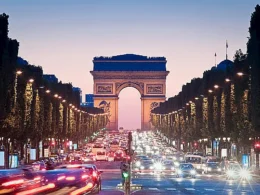French Theatre: a Journey Through Dramatic Arts offers a comprehensive exploration of the rich and influential tradition of French theatre. This journey delves into the origins of French theatre, tracing its evolution through the centuries and the development of dramatic techniques.
The profound impact of influential playwrights and their enduring works is examined, shedding light on their contributions to the global dramatic arts landscape. Additionally, this exploration encompasses the modern-day impact of French theatre and the innovative approaches that continue to shape the art form.
Through a detailed and insightful lens, this study provides a profound understanding of the cultural, historical, and artistic significance of French theatre, offering a window into its enduring legacy.
Origins of French Theatre
While the origins of French theatre can be traced back to medieval religious plays and the courtly spectacles of the Renaissance, its evolution into a distinct art form was significantly influenced by the establishment of permanent theatres in Paris in the 17th century.
Medieval influences, such as the use of morality plays and mystery plays, laid the groundwork for early French theatrical productions. These performances often took place in churches and town squares and were imbued with religious themes and moral messages.
However, it was during the neoclassical period that French theatre truly began to flourish, with playwrights like Pierre Corneille and Jean Racine adapting classical Greek and Roman dramatic forms to create a more structured and formal style of theatre.
The neoclassical adaptations of French theatre laid the foundation for the development of the art form into what it is today.
Evolution of Dramatic Techniques
The evolution of French theatre’s dramatic techniques has been marked by a progressive refinement and diversification of the art form’s expressive tools and methods. Theatrical experimentation and performance styles have continually evolved, incorporating new approaches such as naturalism, symbolism, and surrealism. These developments have enriched the depth and complexity of dramatic storytelling, allowing for a more nuanced exploration of human experiences and societal issues.
Additionally, character development has become increasingly intricate, with actors employing psychological realism and physicality to breathe life into their roles. The use of innovative staging techniques and multimedia elements has further expanded the possibilities of dramatic expression.
As a result, contemporary French theatre continues to captivate audiences with its dynamic and multifaceted approach to storytelling and performance.
Influential Playwrights and Works
The influence of playwrights and their works has been instrumental in shaping the evolution of French theatre’s dramatic techniques, propelling the art form towards new horizons of expressive storytelling and performance.
Molière’s influence on French theatre is undeniable, with his comedic masterpieces challenging societal norms and providing timeless satire.
Additionally, classic tragedies such as Racine’s ‘Phèdre’ and Corneille’s ‘Le Cid’ have left a profound impact on the emotional depth and complexity of French theatre, delving into themes of love, honor, and human frailty.
These works continue to resonate with audiences, evoking profound feelings of empathy, reflection, and introspection.
The enduring power of these influential playwrights and their timeless works continues to shape the landscape of French theatre, inspiring generations of artists to explore the depths of human experience.
Modern-Day Impact and Innovations
Continuing to push the boundaries of artistic expression, modern-day innovations in French theatre have significantly impacted the evolution of dramatic arts.
Contemporary adaptations of classic works have brought a fresh perspective to traditional French theatre, appealing to a broader and more diverse audience. This reimagining of familiar stories has breathed new life into the theatrical landscape, challenging both creators and audiences to engage with familiar narratives in innovative ways.
Moreover, technological advancements have revolutionized the staging and production of French theatre, allowing for immersive and visually stunning performances. From elaborate set designs to cutting-edge audiovisual effects, technology has enhanced the overall theatrical experience, captivating modern audiences and keeping French theatre relevant in the digital age.
As a result, these innovations have shaped a dynamic and forward-looking French theatre scene, ensuring its continued influence on the global stage.
Frequently Asked Questions
What Are the Key Differences Between French Theatre and Other European Theatre Traditions?
Key differences between French theatre and other European traditions lie in the influence by movements like realism and symbolism, avant-garde techniques, and global impact. Additionally, French theatre has showcased lesser-known playwrights, contributing to a diverse theatrical landscape.
How Has French Theatre Been Influenced by Political and Social Movements Throughout History?
Throughout history, French theatre has evolved in response to political and social movements. The influence of revolutions and societal change has shaped dramatic styles, reflecting the political context of each era and highlighting the interconnectedness of theatre and society.
What Role Did French Theatre Play in the Development of Avant-Garde and Experimental Theatre Techniques?
Avant-garde techniques in French theatre developed as a response to societal and artistic conventions. Experimental theatre techniques, often characterized by non-linear narratives and unconventional staging, were crucial in pushing the boundaries of traditional storytelling and performance.
How Has French Theatre Impacted the Global Theatre Scene and Influenced Theatre Traditions in Other Countries?
French theatre has had a significant global impact, influencing theatre traditions in other countries through cross-cultural exchange. Its innovative techniques and avant-garde approach have shaped the global theatre scene, inspiring new forms of expression and storytelling.
What Are Some Lesser-Known French Playwrights and Works That Have Made Significant Contributions to the Dramatic Arts?
Exploring the lesser-known French playwrights and their works reveals a rich tapestry of contemporary influences in the dramatic arts. From the innovative works of Jean Anouilh to the profound storytelling of Yasmina Reza, these playwrights have left significant contributions to the French dramatic tradition.










